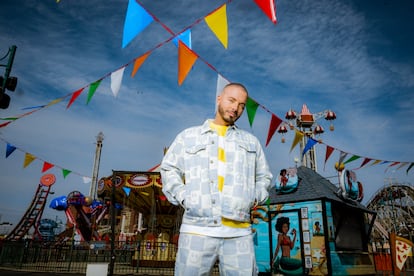J Balvin, the reggaeton artist speaking out about mental health: ‘Sometimes, you work and work and you fail because you never really stop’
The Colombian artist, who has just become a father and has suspended his tour to spend more time with his family, is collaborating with Guess on a capsule collection that he has designed himself

He has a wide smile, lime-colored hair, a white T-shirt and an elegant semi-transparent jacket. J Balvin, the Colombian reggaeton star whose life has just been turned upside down by fatherhood, is once again collaborating with Guess, a reprise after he first designed a collection with the brand in 2019.
The new clothing line is inspired by the documentary “The Boy from Medellin,” released by Amazon Prime last spring. In the film, the Colombian opened up to his fans about his struggles with anxiety, loneliness and depression. “For the people who have seen it, it makes sense, because now they understand that it is a real problem,” he confesses over a Zoom call from New York. “I have no problem commenting on it. There need to be people with a global reach who make mental health visible. There are people who know what we do, who follow us, and if there are issues that they don’t feel comfortable with, that they’re afraid to tackle, and we talk about them, they may have more confidence.”
The new collection, called Guess Originals x J Balvin Amor, features words including “peace” and “love” printed on pants, t-shirts and coats. “The other collection was very bright and colorful, which was what I was feeling at the time. In this case I tried to do something more balanced: peace, love, well-being and mental health,” says Balvin, who repeats the same mantra throughout the conversation: “I am very happy. I feel very comfortable with what I have done. When it comes to collaborations, for me, everything has to have a purpose. In this case, it is to feel better and bring peace and mental health.”
His team has prohibited mentioning the name of the rapper Residente. Two months ago, the former frontman of Calle 13 participated in Argentine producer Bzarrap’s BZRP Music Sessions with an eight-minute song mocking Balvin. The video garnered millions of views on YouTube and seems to have stoked the artist’s fears. He recently suspended the tour that would take him to the United States. “I think it is a good time to share more time with my people, with my family. And start to value it. It is priceless,” he says, explaining that this period has been a particularly spiritual time and has brought him to embrace meditation.
“Now I am in a good place. I have time to think,” he says. “In life, sometimes you work and work and work and the reason you fail is because you don’t really stop to reset your head and get stronger, bigger, faster.” Balvin, now renamed José, has taken on a more relaxed tone, now focused on his family and returning to his roots.
His latest album, “José,” was released in September of last year and featured artists including Dua Lipa, Tokischa, Ozuna, Jhay Cortez, Skrillex and Arcángel. José Álvaro Osorio Balvín continues to delve into the universe of Latin rhythms, now playing songs that are closer to him. “There are really two songs in which I talk about myself and my problems,” he notes, referring to compositions including “7 de Mayo” or “Querido Río,” the latter of which is dedicated to his newborn son with the Argentine model Valentina Ferrer.
“I still believe that I am an emerging artist, that I have a lot to learn, many things to do, to think about, to offer the world. This album was more personal. It even reflects my taste for a certain type of reggaeton,” he says.
Balvin says goodbye with a reflection about his current state, after cancellations, births and the controversy with the “spiritual guide of the movement,” as the journalist Alokofe critically defined Residente: “I feel very good. Every day is a lesson. Being a father teaches me a lot about patience, love, how to seek the best for others, especially my son and my family. And to be very aware of not transferring my fears to my children. Because fears, most of them, are passed down. They are not really part of us.”
Tu suscripción se está usando en otro dispositivo
¿Quieres añadir otro usuario a tu suscripción?
Si continúas leyendo en este dispositivo, no se podrá leer en el otro.
FlechaTu suscripción se está usando en otro dispositivo y solo puedes acceder a EL PAÍS desde un dispositivo a la vez.
Si quieres compartir tu cuenta, cambia tu suscripción a la modalidad Premium, así podrás añadir otro usuario. Cada uno accederá con su propia cuenta de email, lo que os permitirá personalizar vuestra experiencia en EL PAÍS.
¿Tienes una suscripción de empresa? Accede aquí para contratar más cuentas.
En el caso de no saber quién está usando tu cuenta, te recomendamos cambiar tu contraseña aquí.
Si decides continuar compartiendo tu cuenta, este mensaje se mostrará en tu dispositivo y en el de la otra persona que está usando tu cuenta de forma indefinida, afectando a tu experiencia de lectura. Puedes consultar aquí los términos y condiciones de la suscripción digital.









































